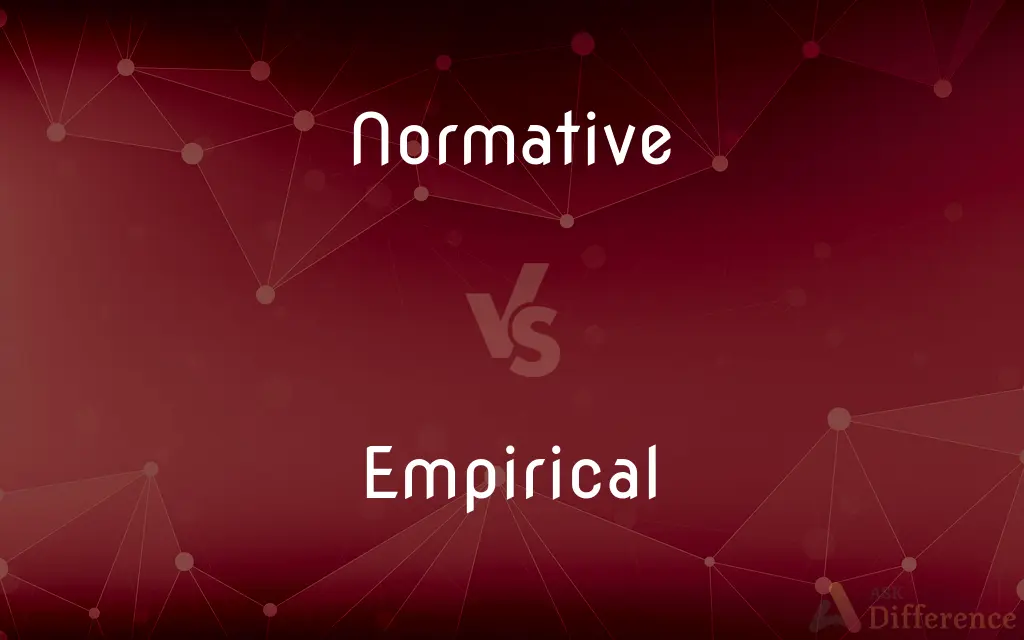Normative vs. Empirical — What's the Difference?
By Urooj Arif & Fiza Rafique — Updated on March 13, 2024
Normative involves judgments about what ought to be, focusing on values and ethics, while empirical is based on observation and evidence, focusing on factual information.

Difference Between Normative and Empirical
Table of Contents
ADVERTISEMENT
Key Differences
Normative statements express judgments about what is desirable or how things ought to be, often grounded in values, ethics, or moral principles. On the other hand, empirical statements are based on observed and measured phenomena, relying on evidence and experimentation to describe how things are.
While normative analysis is concerned with the implications of actions and the ethical considerations behind decisions, empirical analysis seeks to understand the world through data collection and analysis, remaining neutral and objective.
Normative disciplines, such as philosophy and ethics, explore concepts of right and wrong, good and bad, often leading to prescriptive conclusions. Meanwhile, empirical disciplines like science and sociology focus on descriptive conclusions that explain observable phenomena without prescribing what should happen.
In policy-making, normative considerations are crucial for setting goals and defining what outcomes are desirable, guiding decisions on what ought to be achieved. Empirical research, however, provides the evidence and factual basis for understanding the likely outcomes of different policy options, informing decision-makers about what is possible or probable.
Normative statements often reflect personal or societal values and can vary widely between cultures or individuals. In contrast, empirical statements aim to be universally valid, grounded in observable and measurable facts that are independent of personal values or beliefs.
ADVERTISEMENT
Comparison Chart
Basis
Values, ethics, moral principles
Observation, evidence
Objective
To prescribe what ought to be
To describe what is, based on data
Disciplines
Philosophy, ethics
Science, sociology
Analysis Type
Qualitative, judgment-based
Quantitative, measurement-based
Role in Policy-making
Defining desirable outcomes
Informing on possible outcomes
Universality
Subject to cultural/personal variation
Seeks universal validity
Statements Example
We should reduce pollution for a healthier environment.
Reducing pollution decreases respiratory illnesses.
Compare with Definitions
Normative
Prescriptive Judgments.
Reducing pollution is essential for public health.
Empirical
Based on Evidence.
Studies show that reducing pollution improves health.
Normative
Cultural Variation.
Different cultures have varied norms about free speech.
Empirical
Factual Information.
The empirical evidence supports the theory of evolution.
Normative
Values-Based.
A fair society distributes wealth equitably.
Empirical
Statistical Analysis.
Statistical analysis confirms a correlation between education and income levels.
Normative
Ethical Considerations.
It's our moral duty to combat climate change.
Empirical
Observational Data.
Data indicates a rise in global temperatures over the past century.
Normative
Ideal States.
In an ideal world, there would be no poverty.
Empirical
Universal Statements.
Water boils at 100°C at sea level, regardless of location.
Normative
Normative generally means relating to an evaluative standard. Normativity is the phenomenon in human societies of designating some actions or outcomes as good or desirable or permissible and others as bad or undesirable or impermissible.
Empirical
Relying on or derived from observation or experiment
Empirical results that supported the hypothesis.
Normative
Of, relating to, or prescribing a norm or standard
Normative grammar.
Empirical
Verifiable or provable by means of observation or experiment
Empirical laws.
Normative
Of or pertaining to a norm or standard.
Empirical
Guided by practical experience and not theory, especially in medicine.
Normative
Conforming to a norm or norms.
Normative behaviour
Empirical
Pertaining to or based on experience .
The lengths were calculated according to the empirical rules of the trade.
For some presumptive diagnoses, empirical antibiotic therapy begins immediately, whereas specific antibiotic therapy must await the results of the culture and sensitivity test.
Normative
Attempting to establish or prescribe a norm.
Normative grammar
Empirical
Pertaining to, derived from, or testable by observations made using the physical senses or using instruments which extend the senses.
Normative
A regulation imposed to preserve a norm.
Empirical
(philosophy of science) Verifiable by means of scientific experimentation.
Demonstrable with empirical evidence
Normative
Relating to or dealing with norms; as, normative discipline; normative samples.
Empirical
Derived from experiment and observation rather than theory;
An empirical basis for an ethical theory
Empirical laws
Empirical data
An empirical treatment of a disease about which little is known
Normative
Giving directives or rules; prescriptive. Opposed to descriptive.
Empirical
Relying on medical quackery;
Empiric treatment
Normative
Based on or prescribing a norm or standard; as, normative grammar.
Normative
Relating to or dealing with norms;
Normative discipline
Normative samples
Normative
Giving directives or rules;
Prescriptive grammar is concerned with norms of or rules for correct usage
Normative
Based on or prescribing a norm or standard;
Normative grammar
Normative
Dealing with or based on norms;
A normative judgment
Common Curiosities
Can normative and empirical analyses coexist?
Yes, they often complement each other, especially in fields like policy-making where both ethical considerations and factual evidence are crucial.
How do normative statements influence society?
They guide behavior and policy decisions based on ethical considerations and societal values.
What is an empirical statement?
An empirical statement describes what is, based on observation and evidence.
How does empirical evidence influence policy-making?
It informs policymakers about the likely outcomes of their decisions, based on data and analysis.
How do cultural values affect normative statements?
Normative statements can vary significantly across cultures due to differing values and ethical beliefs.
How do personal values intersect with empirical research?
While personal values can influence the questions researchers choose to explore, empirical research itself aims to remain neutral and fact-based.
Why are normative considerations important in policy-making?
They help define the goals and ethical framework within which policies are formulated.
What is a normative statement?
A normative statement expresses what ought to be, based on values and ethics.
What role does empirical research play in science?
It forms the backbone of scientific inquiry, providing evidence and data to support or refute theories.
What is an example of a normative discipline?
Ethics, which explores moral principles and how individuals ought to act.
Can a statement be both normative and empirical?
Statements typically fall into one category, but discussions can involve both perspectives to provide a comprehensive view.
What is an example of an empirical discipline?
Sociology, which studies society and human behavior through observation and data collection.
What makes a statement universally valid in empirical research?
It is based on observable, measurable facts that are independent of personal or cultural beliefs.
Why is objectivity important in empirical research?
Objectivity ensures that conclusions are based on unbiased evidence, making findings reliable and universally applicable.
How can empirical research test normative theories?
It can provide data on the outcomes of actions prescribed by normative theories, testing their practical implications.
Share Your Discovery

Previous Comparison
Product vs. Brand
Next Comparison
Enantiotopic vs. DiastereotopicAuthor Spotlight
Written by
Urooj ArifUrooj is a skilled content writer at Ask Difference, known for her exceptional ability to simplify complex topics into engaging and informative content. With a passion for research and a flair for clear, concise writing, she consistently delivers articles that resonate with our diverse audience.
Co-written by
Fiza RafiqueFiza Rafique is a skilled content writer at AskDifference.com, where she meticulously refines and enhances written pieces. Drawing from her vast editorial expertise, Fiza ensures clarity, accuracy, and precision in every article. Passionate about language, she continually seeks to elevate the quality of content for readers worldwide.














































